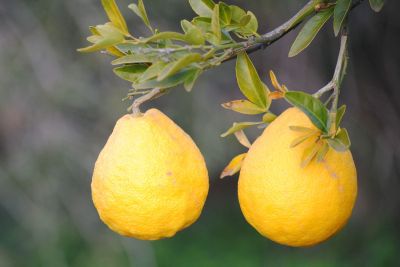What is a Sweet Lemon?
Given that there are many citrus hybrids referred to as sweet lemon or sweet lime, what exactly is a sweet lemon? Sweet lemon (or sweet lime) is a generic catchall term used to describe citrus hybrids with low acid pulp and juice. Sweet lemon plants are not true lemons, but a lemon hybrid or a cross between two other types of citruses. In the case of Citrus ujukitsu, this sweet lemon fruit tree is thought to be a strain of tangelo, which is a cross between a grapefruit and a tangerine.
Ujukitsu Sweet Lemon Information
The Ujukitsu is a sweet lemon plant from Japan that was developed by Dr. Tanaka in the 1950s. It is sometimes called the ‘lemonade fruit’ in reference to its sweeter, almost lemonade flavor. A USDA Research Center called Rio Farms brought this sweet lemon to the United States. The center was shut down and the citrus there were left to live or die. The region had a significant freeze in 1983, killing most of the citrus, but one Ujukitsu survived and John Panzarella, a Master Gardener and expert on citrus, collected some budwood and propagated it. Ujukitsu sweet lemons have a weeping habit with long arching branches. Fruit is borne at the ends of these branches and is pear form in shape. When ripe, the fruit is bright yellow with thick fruit that is difficult to peel. Inside, the pulp is mildly sweet and juicy. Ujukitus grow more slowly than other citrus but fruits earlier than other “sweet lemon” trees, such as Sanoboken. They bloom profusely with aromatic blossoms in the spring followed by fruit formation. The largest fruit is about the size of a softball and ripens through the fall and into winter.
How to Grow Citrus Ujukitsu Trees
Ujukitsu trees are small citrus trees, only 2 to 3 feet (61-91 cm.) tall and perfect for container growing, provided the pot is well draining. As with all citrus plants, Ujukitsu trees dislike wet roots. They prefer full sun and can be grown outside in USDA zones 9a to 10b or indoors as a houseplant with bright light and average room temperatures. Caring for these trees is similar to that of any other citrus tree type– be it in the garden or grown indoors. It needs regular watering but not in excess and feeding with a fertilizer for citrus trees is recommended per the guidelines listed on the label.
